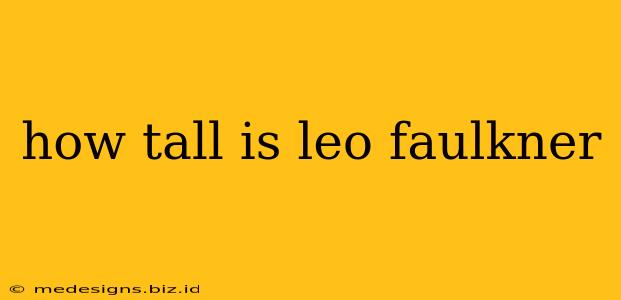The question, "How tall is Leo Faulkner?" is surprisingly elusive. There's no readily available information on the internet regarding the height of this individual. This lack of readily accessible information could be due to several reasons:
-
Privacy: Many people, including public figures outside the immediate spotlight, choose not to publicly share their height or other personal details. This is perfectly understandable and should be respected.
-
Lack of Public Profile: If Leo Faulkner isn't a public figure (actor, athlete, politician, etc.), information about his height would simply not be a matter of public record or widely reported.
-
Misspelling or Alias: It's also possible there's a misspelling in the name, or Leo Faulkner may be using an alias. A slight variation in spelling could make finding information significantly more difficult.
How to Potentially Find Out (Ethically and Respectfully)
If you need to know Leo Faulkner's height for a specific reason (perhaps a professional context), there are a few ethical and respectful ways to approach this:
-
If you know Leo Faulkner personally: The most straightforward approach is simply to ask him politely.
-
If you know someone who knows Leo Faulkner: Ask a mutual acquaintance if they know his height.
-
If the reason is professional: If your need to know his height is related to a professional project (like fitting him for a uniform or equipment), explain this clearly and respectfully to him or his representative.
Understanding the Importance of Privacy
It's crucial to remember that individuals have a right to privacy. While searching for information is a normal part of online interactions, it's important to be sensitive to the potential for intrusion. Respecting people's privacy boundaries is paramount.
Conclusion: Respecting the Unknown
Ultimately, the height of Leo Faulkner remains unknown based on currently accessible information. Instead of focusing on obtaining information that might be private, it's important to respect an individual's right to privacy and to focus on more readily available information or alternative methods to address the underlying need for this data, if one exists.
